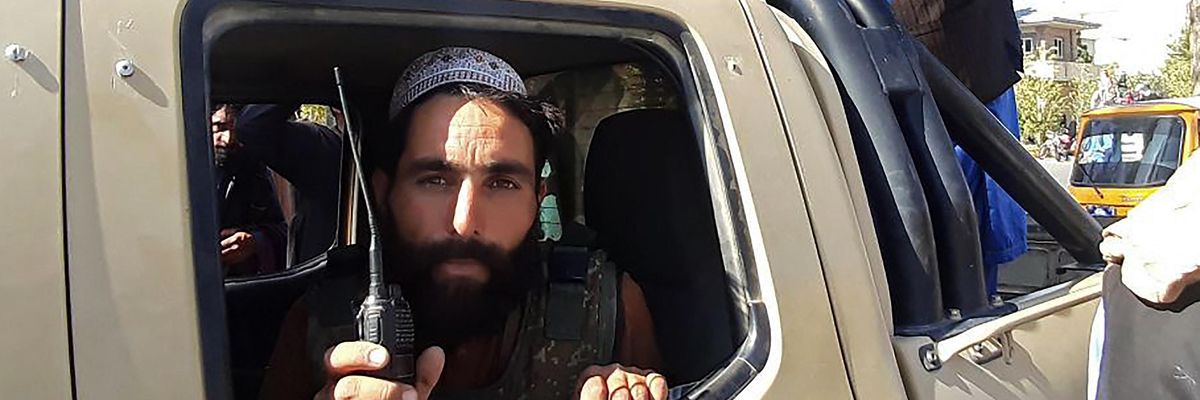As the Taliban on Friday made further gains in control over territory--uprooting thousands of Afghan civilians--longtime critics of the Afghanistan war say the current situation is an "inevitable" outcome of the United States' doomed and deadly two-decade military pursuit that's cost over 2 trillion dollars and untold human death and suffering.
"The U.S. designed the Afghan state to meet Washington's counterterrorism interests, not the interests of Afghans, and what we see today is the result," tweeted Anand Gopal, journalist and author of No Good Men Among the Living: America, the Taliban and the War Through Afghan Eyes, on Thursday.
"There was not at that time--there is now not--a military solution to terrorism."
--Phyllis Bennis
Foreign policy scholar and author Phyllis Bennis, a fellow at the Institute for Policy Studies, had a similarly blunt assessment.
"I think it's important that we recognize that this kind of a crisis was inevitable whenever the U.S. pulled out, whether it had been 10 years ago, 19 years ago or 10 years from now, the reason being that this was rooted in the nature of the U.S. occupation that began in 2001," she told Democracy Now! this week.
"There was not at that time--there is now not--a military solution to terrorism," she said, "which was ostensibly the reason for the invasion and occupation of Afghanistan."
Pentagon spokesperson John Kirby said Thursday that the U.S. is sending 3,000 troops for what he asserted was a "narrowly focused mission" to help evacuate Kabul embassy staff. The U.K. is also sending 600 troops to get its citizens out. The U.S. military is still conducting air strikes in Afghanistan, and the CIA is continuing its operations in the country.
The Associated Pressreported Friday on how the Taliban has swiftly seized significant territory in Afghanistan over the past week.
"The Taliban completed their sweep of the country's south on Friday as they took four more provincial capitals in a lightning offensive that is gradually encircling Kabul, just weeks before the U.S. is set to officially end its two-decade war," reported AP. Gains included the seizure of the country's second and third biggest cities--Taliban birthplace Kandahar and Herat. The Taliban now control more than two-thirds of the country.
The country's biggest city and capital, Kabul is still under Afghan government control, but, the New York Timesreported Friday, insurgents are closing in on that city as well.
"The speed of the cities' collapse, combined with American officials' announcement Thursday that they would evacuate most of the United States Embassy, has deepened the sense of panic across the country as thousands try to flee from the Taliban advance," the Times reported.
It was already precarious for civilians.The United Nations Assistance Mission in Afghanistan (UNAMA) announced in July that civilian casualties in Afghanistan hit record levels for the first half of 2021. The year could see the highest ever annual number of documented civilian casualties, UNAMA added.
Addressing the current crisis, Stephane Dujarric, spokesperson for U.N. Secretary-General Antonio Guterres, expressed concern Thursday about "the shift of fighting to urban areas, where the potential for civilian harm is even greater."
But war hawks' assertion that President Joe Biden's troop withdrawal is to blame is false, said Benjamin Friedman, policy director at Defense Priorities.
"The inability of the Afghan security services to hold territory in much of Afghanistan without U.S. assistance is not a reason to keep U.S. forces there--it is an indictment of the project that kept U.S. forces there so long," he said in a Monday statement. "The state-building mission failed, and building a capable military on top of a bad state foundation is nearly impossible."
The deteriorating situation has also elicited comparisons to U.S. troops leaving Vietnam in 1975, an analogy rejected as "lazy" analysis by Stephen Miles, executive director of Win Without War.
"I would love if just one of the politicians or pundits making this argument could point to where in the historical record the fall of Saigon led to the American public reversing their course in opposition to the war in Vietnam and supporting a renewed U.S. engagement in the war," he wrote in a Thursday Twitter thread. "Much like Afghanistan, the American public had long since concluded that the reason to exit the war was the war's very failure and futility."
"Like most of America's military misadventures, no one will look back through history with anything but shame and sorrow for the human suffering wrought and the repeated failures of the U.S. war machine. That has long been true already of the public's view of the U.S. Afghan war," added Miles.
According to Rep. Ro Khanna (D-Calif.)--who called the Afghanistan war "a colossal waste of resources"--Biden was right to pull out troops.
Speaking with Democracy Now! on Wednesday about the developing situation in Afghanistan, Khanna said that an attempt to prevent any "Taliban control over Afghanistan... was a fool's errand."
As for what needs to happen now, Khanna said, "We need to do whatever we can with the international community and the regional community there to seek a ceasefire, to seek peace, to do what we can to uphold human rights, recognizing that the Taliban does violate human rights."
"We have to do the best we can in the circumstances," he said, "and we need to do the best we can for the civilians, including making sure that we are taking our share of asylum seekers from the area and that we're doing what we can to provide water and basic necessities to the civilians through the international organizations."

